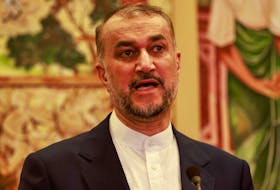By Isla Binnie
MADRID (Reuters) - As they prepare to vote in the most uncertain national election in decades, Spaniards can safely predict one thing regardless of political persuasion - that their next prime minister will be young, cosmopolitan, white and male.
The main contenders in Sunday's ballot offer a lack of diversity that has left parts of the electorate at risk of feeling unrepresented, political commentators say. Surveys show up to four in ten voters are still undecided and no single party is close to winning a majority.
Conspicuously missing from the field are women, as well as anyone who identifies directly with the rapidly aging communities of rural Spain, a constituency that is fast emptying out as working-age people abandon farms and villages for cities.
"We have ended up with something like a Corte Ingles catalogue," said political communication consultant Luis Arroyo, referring to a famous Spanish chain of department stores.
A televised pre-election debate on Monday night did little to dispel that impression.
No clear winner emerged, and images of the top three candidates - Socialist Pedro Sanchez and rightists Pablo Casado and Albert Rivera - appearing in virtually identical dark blue suits circulated widely in domestic and international media.
Far-right Vox's Santiago Abascal, excluded from the debate because his party holds no parliamentary seats yet, tweeted a picture shortly after it ended of a row of blue and yellow macaws with the caption: "Spot the difference".
'PEDRO EL GUAPO'
Sanchez, outgoing Prime Minister and poll leader with around 30 percent of votes, earned the nickname "Pedro El Guapo", or "Handsome Pedro" earlier in his career for his rarity value as a young newcomer to the Socialist hierarchy among a crowd of older politicians.
But as it has gradually fractured over the past five years, Spain's political landscape has been increasingly populated by young, contemporary males.
At 47, Sanchez is now the oldest candidate. The last time he stood for office, in 2016, he lost out to conservative Mariano Rajoy, then 61.
His clean-cut conservative opponent this time is 38-year-old Casado, while Rivera - leader of centre-right Ciudadanos and equally chiselled in features and in his choice of suits - is one year older.
Even far-right Vox's Abascal, 43, is university-educated, keeps his beard neatly trimmed and often wears a tie.
Only the pony-tailed Pablo Iglesias, whose far-left Podemos party rode a wave of anti-austerity fury into parliament in 2015, dresses more casually but, as a television regular, he keeps his appearance smart. On Monday evening he did not wear a suit.
While younger, city-dwelling, professionals may see familiar characters in the shiny line-up, people in less technologically advanced, under-populated parts of the country may struggle.
"They reflect this generation of people, many of whom studied in public universities and did masters (degrees)," said Arroyos.
"The other Spain, which is more rural, and famously emptying out, does not see itself reflected in any way."
Residents of the depopulating regions marched through Madrid last month in what they called a "peaceful revolt", underlining the concerns of a demographic that feels it has been forgotten.
GENDER BIAS?
Despite the visible generational shift, few Spanish women have made it to the political front line.
"In terms of gender balance there is definitely still lots of room for improvement," said Eurasia analyst Federico Santi.
Sanchez describes his government, in which a majority of ministers are female, as feminist, and Podemos changed the name of its parliamentary grouping to the feminine Unidas Podemos for this campaign, to reflect its commitment to women's rights.
Two parties have high-profile spokeswomen: Ines Arrimadas of the center-right Ciudadanos has led her party's crusade against Catalan regional independence, while Irene Montero is a prominent Podemos deputy.
But neither are party leader and, across the parties, women tend mostly to be assigned supporting roles, Santi said.
The lack of racial diversity among the candidates has raised few eyebrows, however, due to Spain's relative ethnic homogeneity - only just over 10 percent of the resident population has foreign nationality.
(Reporting by Isla Binnie; Editing by Ingrid Melander and John Stonestreet)








